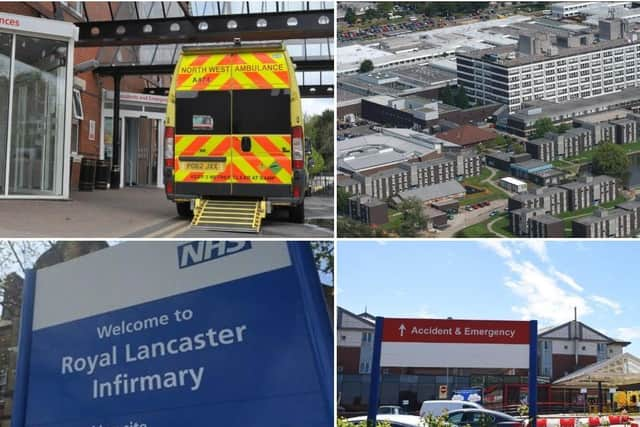Infection rates shoot up across Lancashire - here's how your area compares
and live on Freeview channel 276
Just one local authority area - Chorley - noted a fall in new coronavirus cases, according to figures.
Nine in 10 areas in England marked a rise in the seven days to December 16 compared to the week before.
Advertisement
Hide AdAdvertisement
Hide AdThurrock in Essex has the highest rate in the country after seeing the largest week-on-week jump nationally, following by Havering in London and Basildon, also in Essex.


Pendle has the highest rate in Lancashire, with a rate of 314.8 per 100,000, up from 243.2, followed by Hyndburn, which has a rate of 282.8, up from 170.3.
Preston's infection rate is 251.5, up from 192.8, while Blackburn with Darwen's is 250.5, up from 243.8.
Rossendale's is 237.8, up from 209.8.
The Ribble Valley's is 233.2, up from 187.2.
And Chorley's is 203, down from 209.8.
While still relatively low, Lancaster's infection rate has almost doubled from 99.3 to 183.5.
West Lancashire's rate is 162.7, up from 142.6.
Advertisement
Hide AdAdvertisement
Hide AdBlackpool's is 158.5, up from 154.2, while Wyre's is 145.4, up from 118.7, and Fylde's is 96.6, up from 92.8.
It comes as an expert said vaccination alone will not be enough to bring coronavirus in the community down to "very low levels" and social restrictions may have to continue until around 50 per cent of the population has been jabbed.
Many people have been hoping for a return to normal once the elderly and those most at risk from Covid-19 have received the jab.
But scientists say this might not be enough to see an end to measures such as social distancing and wearing face masks.
Advertisement
Hide AdAdvertisement
Hide AdThey suggest restrictions may be needed until at least half of the UK’s population has been vaccinated.
Stephen Evans, professor of pharmacoepidemiology at the London School of Hygiene and Tropical Medicine, said vaccination alone will not be enough to bring the virus circulating in the community to “very low levels”.
Speaking at a Science and Media Centre press briefing, he said: “We actually need to have the absolute amount of virus circulating to be very low.
“And we won’t do that by vaccination alone until we’re getting 50% of the population vaccinated or more, and that’s going to be quite a bit of a long way off yet.
Advertisement
Hide AdAdvertisement
Hide Ad“So I fear that the sort of restrictions we have, the non-medical interventions, are going to need to be carried on.”
Prof Evans added: “I think if people take these seriously, then it’s possible for various economic activities to go ahead, but you have to make sure that you are keeping to the non-medical interventions, being aware and behaving as if every person you contact has got the virus. And that you have it as well.
“And when you behave in a way that realises that, and that the consequences for either you or the person around you getting the virus can be very serious, then it changes people’s behaviour.
“And we’re going to have to go on doing that for quite a long time.”
Advertisement
Hide AdAdvertisement
Hide AdHealth Secretary Matt Hancock has said that as of 8am on Saturday morning, 350,000 people had been vaccinated.
Adam Finn, professor of paediatrics at the University of Bristol, also said that even if the elderly are vaccinated, social restrictions may have to continue for some time.
He explained: “I think the modelling is very clear that even if you had high coverage and high levels of protection in the high-risk groups, you would still see epidemics, and large numbers of hospitalisations and deaths if you relax the measures before you have a broader control of viral circulation in the population at large.
“So I think the idea that you can immunise a large proportion of the elderly and then kind of go back to normal is misguided.
Advertisement
Hide AdAdvertisement
Hide Ad“I think that none of the models suggest that that’s going to be possible.”
Peter Openshaw, professor of experimental medicine at Imperial College London, explained that as well as the elderly, there has to be concern about the effects of long Covid in relatively young people.
He said he found the idea of his colleagues or his relatives becoming affected by long Covid “terrifying”.
Prof Openshaw added: “We shouldn’t stop vaccinating once we have just vaccinated the high risk.
Advertisement
Hide AdAdvertisement
Hide Ad“I think we have to get the population vaccinated and I think the prospects of vaccines preventing long Covid are quite good.”
It is thanks to our loyal readers that we can continue to provide the trusted news, analysis and insight that matters to you. For unlimited access to our unrivalled local reporting, you can take out a subscription here and help support the work of our dedicated team of reporters.